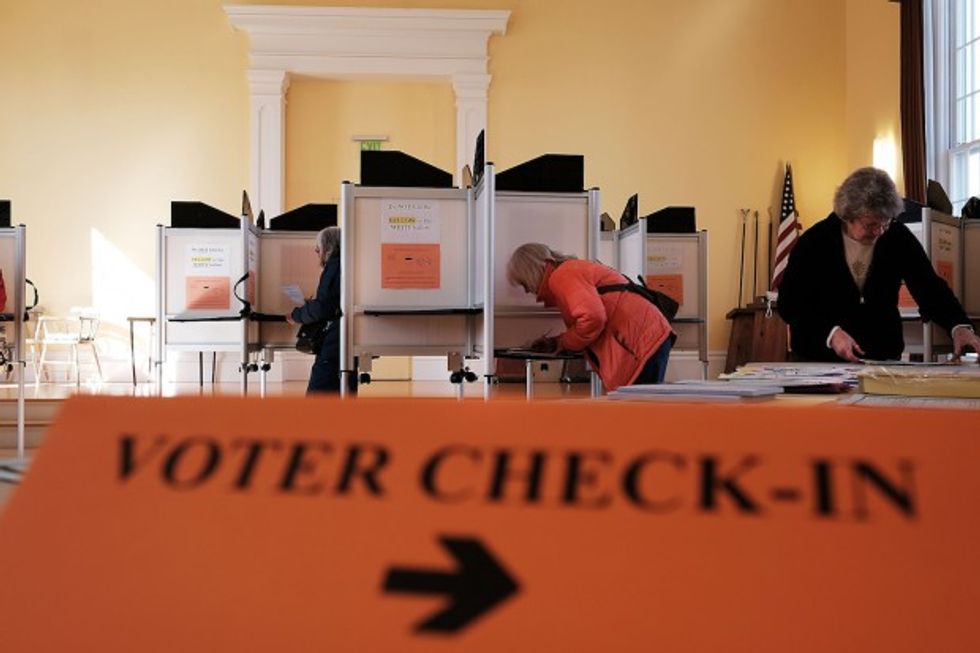Despite the fact that we’ve been burned before, most Americans continue to allow themselves to be bamboozled into casting their votes for one candidate or another, believing that this time they mean what they say, this time they really care about the citizenry, this time will be different.
Of course, it never turns out differently.
We are as easily discarded the day after the elections as we were wantonly wooed in the months leading up to the big day. Those same politicians who were once so eager to pose for our pictures, smile at our jokes, and glad-hand us for our votes will, upon being elected, retreat behind a massive, impenetrable wall that ensures we are not seen or heard from again—at least, until the next election.
The joke is on us.
 (Photo by Spencer Platt/Getty Images)
(Photo by Spencer Platt/Getty Images)
As I point out in my book "Battlefield America: The War on the American People," all of the caucuses, primaries, nominating conventions, town hall meetings, rallies, meet and greets, delegates and super-delegates are sophisticated schemes aimed at advancing the illusion of participation culminating in the reassurance ritual of voting.
It’s not about Red Republicans or Blue Democrats. It’s about Green Donors—i.e, those with money who can afford to pay for access.
It works the same with every politician and every party.
Indeed, the First Amendment’s assurance of a right to petition the government for a redress of grievances has become predicated on how much money you’re willing to shell out in order to gain access to your elected and appointed officials.
Then again, money has always played a starring role in American politics.
Bill Clinton famously allowed top-dollar donors to spend a night in the Lincoln Bedroom at the White House in exchange for roughly $5.4 million in donations to the Democratic National Committee. A $500,000 donation might get you invited to a quarterly meeting with Barack Obama. And for a mere $5,000 donation, lobbyists are being given exclusive invitations to join Congressmen and senators for weekend getaways that include wine tastings, fly fishing, skiing, golfing, hunting, spas, seaside cocktail parties and more.
If you’re just a lowly citizen with limited cash, however, you’re out of luck.
Try contacting your so-called representatives without paying for the privilege, and see how far that gets you. I can assure you that you won’t be given the kinds of access that lobbyists, special interest groups and top donors enjoy.
Having been saddled with a pay-to-play system that provides access only to those with enough cash to grease the wheels of the political machine, average Americans have little to no say in the workings of their government and even less access to their so-called representatives.
Donald Trump, as he has boasted, might be able to buy and sell politicians of all stripes (including Hillary Clinton), but the average American would be hard-pressed to get the kind of access enjoyed by corporate executives, lobbyists and other members of the moneyed elite.
Indeed, members of Congress have to work hard to keep their constituents at a distance—minimizing town-hall meetings, making minimal public appearances while at home in their districts, only appearing at events in controlled settings where they’re the only ones talking, and if they must interact with constituents, doing so via telephone town meetings or impromptu visits to local businesses where the chances of being accosted by angry voters are greatly minimized.
And under the Trespass Bill, passed by Congress in 2012 and signed into law by President Obama, if you dare to exercise your First Amendment right to speak freely to a politician, assemble in public near a politician, or petition a government official for a redress of grievances, you risk a fine or a lengthy stay in prison.
Talk about self-serving.
Under the guise of protecting government officials from physical attacks, the Trespass Bill criminalizes First Amendment activity by making it a federal offense, punishable by up to 10 years in prison, to protest anywhere the Secret Service might be guarding someone.
Mind you, the Secret Service not only protects the president but all past sitting presidents, members of Congress, foreign dignitaries, presidential candidates, and anyone whom the president determines needs protection, but is also in charge of securing National Special Security Events, which include events such as the G8 and NATO summits, the National Conventions of both major parties, and even the Super Bowl.
The law essentially creates a roving bubble zone where the First Amendment is effectively off-limits, thereby putting an end to free speech, political protest and the right to peaceably assemble in all areas where government officials happen to be present.
Consider yourself warned: If you do dare to show up to a Trump or Clinton rally and even appear to be the kind of person who might engage in any kind of protest, lawful or otherwise, you could find yourself quickly dispatched to a “free speech zone” out of sight and sound of the candidates.
The message is clear: in an age of robber barons, “we the people” are expected to just shut up and vote.
The powers-that-be want us to be censored, silenced, muzzled, gagged, zoned out, caged in and shut down. They want our speech and activities monitored for any sign of “extremist” activity. They want us to be estranged from each other and kept at a distance from those who are supposed to represent us. They want taxation without representation. They want a government without the consent of the governed.
They want the police state.
The system has been so corrupted and compromised that there are few left in the halls of government who hear or speak for us.
Congress does not represent us. The courts do not advocate for us. The president does not listen to us. And the First Amendment’s assurance of the right to speak freely and petition our government for a redress of grievance no longer applies to us.
So if representative government has become an exercise in futility, where does that leave us?
One of the key ingredients in maintaining democratic government is the right of citizens to freely speak their minds to those who represent them. In fact, it is one of the few effective tools we have left to combat government corruption and demand accountability.
If there is to be any hope of righting the wrongs that are being perpetrated against the American people, we must make them—our elected officials—hear us.
But where to begin?
Start by opening up a dialogue within your own community about what’s wrong with this country. Stop focusing on the issues that divide, and find common ground with your fellow citizens about issues on which you can agree. Focus less on politics and more on principles. Stop buying into the false and divisive narratives that are being promulgated by political windbags and start thinking and speaking for yourselves.
Once you’ve found that common ground, whatever it might be, make enough noise at the local level—at your city council meetings, in your local paper, at your school board meetings, in front of your courthouses and police stations—and the message will trickle up. Those in power may not like what they hear, but they will hear you.
Remember, there is power in numbers.
There are 319 million of us in this country. Imagine what we could accomplish if we actually worked together, presented a united front, and spoke with one voice?
The police state wouldn’t stand a chance.
–
TheBlaze contributor channel supports an open discourse on a range of views. The opinions expressed in this channel are solely those of each individual author.


 (Photo by Spencer Platt/Getty Images)
(Photo by Spencer Platt/Getty Images)






